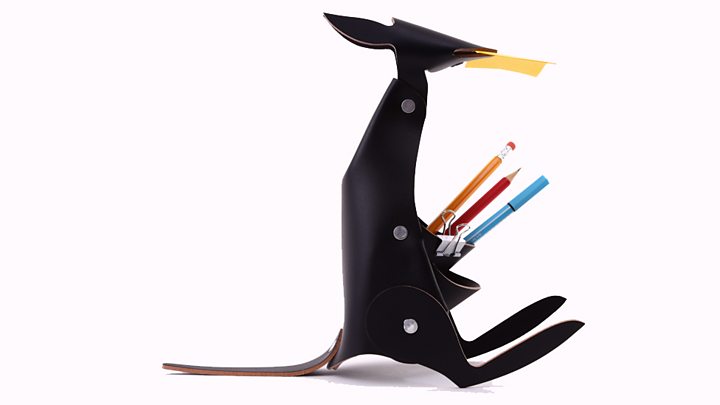The BBC's weekly The Boss series profiles a different business leader from around the world. This week we speak to Matias Fernandez Moore, chief executive of Argentine leather products firm Vacavaliente.
Matias Fernandez Moore knew he had to act fast if he was going to try to avoid making staff redundant.
As the boss of Argentine company Vacavaliente, back in 2015 when the country's economic woes were returning, he expected domestic sales to fall sharply.
The business didn't export anything at the time, but as Argentina slid towards recession Matias knew he had to look overseas - and quickly.
Determined that none of his 50 employees would lose their jobs, the then 35-year-old took Vacavaliente on a global roadshow, displaying its leather home, office and fashion accessory goods to potential buyers around the world.
"Our vision is to never lay anyone off," he says. "These are the people who took us to where we are."
Over the next three years the company went from zero exports to selling in 42 countries, including the US and UK, and no employees lost their jobs.
Today 75% of Vacavaliente's $4m (£3.1m) revenues come from international markets, helping it to more than double its annual turnover every year since 2015, despite ever worsening economic conditions in Argentina.
Mired in an economic crisis, the country currently has an interest rate of 60% as it wrestles with inflation of 48%. Meanwhile, government spending reforms and cuts in subsidies have seen utility bills quadruple, and the currency, the peso, lost half its value in 2018.
Against that backdrop Matias's stewardship of Vacavaliente is impressive, more so when you consider that he is a university dropout who joined the company as an intern.
Being Argentine can be both a blessing and a curse for a business, and Vacavaliente's initial success owed much to the country's culture.
Vacavaliente, which means "brave cow" in Spanish, was created in 2006 by designers. They wanted to use recycled leather to create everything from briefcases to notepads, wine racks and pen holders.
This leather was in abundant supply, off-cuts from a leather industry that is itself a by-product of Argentina's vast cattle industry.
Matias joined Buenos Aires-based Vacavaliente later in its first year. Aged 26, he was taken on as a design intern, just as the firm was about to have a major stroke of luck.
Its handmade products caught the eye of curators at New York's Museum of Modern Art (MoMa), who invited Vacavaliente to showcase one item in an exhibition called Destination Buenos Aires, along with 11 other designers.
The piece the company presented at the exhibition remains one of its bestselling items - a leather desktop kangaroo that can be used to store pens, pencils, paper clips and mobile phones.

Media playback is unsupported on your device
It became a huge hit at the MoMa gift shop, and Vacavaliente's kangaroo was featured in the New York Times and Washington Post newspapers.
"We were very lucky," says Matias. "The company had started in a living room and hadn't existed for more than a year, but suddenly our product was already being shown and sold in one of the most recognised showcases of the design world.
"That gave us a huge boost. We were an immediate success."
Two days after the exhibition opened, MoMa placed an order for their product that was 10 times the original agreement. Vacavaliente subsequently received enquiries from 20 countries wanting to import their leather kangaroos.
With just a dozen or so people in the company, Matias took the opportunity to show that he was much more than just a design intern.
"I started off with other interns in the small design office we had," he says. "And from there I started to notice gaps and problems in different parts of the company.
"I began taking responsibility for them in a natural, organic way. Soon I was a key part in the decision-making process of the company, which led me to take on more responsibilities."
As Vacavaliente grew, Matias quickly rose through the ranks until eventually he was offered a stake in the business. By this time, his commitment to the firm was taking its toll, and he dropped out of an industrial design degree course.
While Vacavaliente's success initially came from overseas, it slowly started focusing more and more on the domestic market until it eventually stopped exporting.
More The Boss features:
This made sense at the time because Argentina's economy grew strongly for a decade from 2003.
Domestic sales were still on the rise in 2011 when some partners left the business and Matias was appointed chief executive. But four years later he had to quickly restart exports.
Mark Ramondt, a member of the executive board at the Association of Argentine Entrepreneurs, says Matias has the "classic Argentine entrepreneur gene".
By this he means that Matias is prepared to tackle problems that most businesspeople elsewhere on the planet don't understand.
"To survive here you need a high level of entrepreneurship just to get through the day," says Mr Ramondt. "You need to wake up and figure out how to deal with a skyrocketing dollar, huge inflation and insecurity on the streets."
With no end in sight for Argentina's economic woes, Matias says he just gets on with things.
"I haven't run businesses in other parts of the world, so I wouldn't know what it is like in other places. I only know this," he says.
"So I just work with what I have and I don't complain."
Read again 'Our vision is never to lay anyone off' - BBC News : https://bbc.in/2Fr57GuBagikan Berita Ini















0 Response to "'Our vision is never to lay anyone off' - BBC News"
Post a Comment